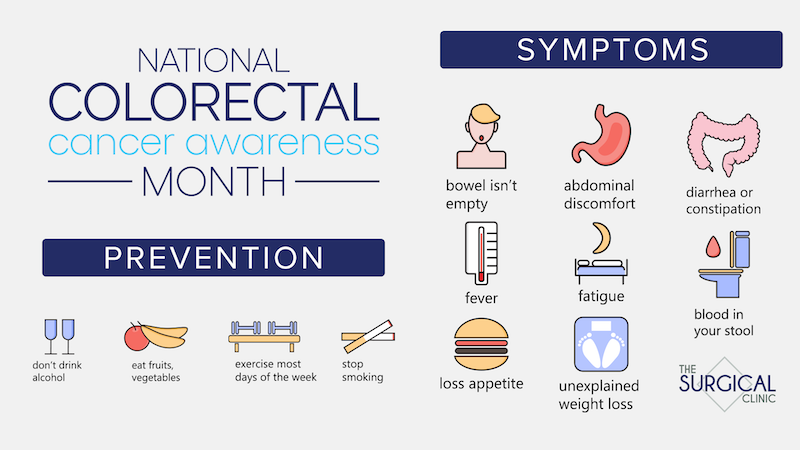Just as February 4th each year is World Cancer Day, every March is Colorectal Cancer Awareness Month. This type of cancer is the third most diagnosed cancer in the United States. Cancer happens when cells mutate and start to grow abnormally which eventually becomes harmful and disrupts critical organ functions. In terms of colorectal cancer, these cell growths, or tumors, begin in the colon or rectum and eventually affect the surrounding tissues.
In order to raise awareness during this month, organizations like the Colorectal Cancer Alliance hold events and fundraisers. Individuals are also encouraged to get involved, share their stories, and participate in localized awareness efforts. It is important to raise awareness for this form of cancer because it is one of the few types of cancer that can be prevented with cancer screenings.
Continue reading to learn more about colorectal cancer such as its risk factors, prevention, and treatment options. If you or someone you know is looking for more answers and treatment, please reach out to any of our expert providers at The Surgical Clinic.
Learn more about why raising Colorectal Cancer awareness is important and how you can get involved in making a change for the world, even after Colorectal Cancer Awareness Month.
Colorectal Cancer Month Events
One of the signature awareness events associated with Colorectal Awareness Month is the Undy RunWalk. This event was invented by the Colorectal Cancer Alliance (CCA) and is hosted by local volunteers all over the United States. Essentially, these events are a fun run where people can choose to run in event themed boxers or briefs.
As a side note, this awareness month’s official colors are blue, and the CCA implements these with the themed underwear they provide at the Undy WalkRun events. All proceeds from the events are given to cancer research organizations. Other CCA sponsored events include a Blue Hope Bash and a Dress in Blue Day.
Individuals are also encouraged to share their stories about living with colorectal cancer. The goal of this initiative is to inspire hope with stories of success. Visit an official colorectal cancer site to learn about more ways that you can get involved during Colorectal Cancer Awareness Month.

Colorectal Cancer Risk Factors
There are several risk factors for colorectal cancer. For example, the most common risk factors include:
- Age
- Family History of Cancer
- Crohn’s Disease
- Ulcerative Colitis
- High fat low fiber diet
- High protein diets
- Diabetes
- Smoking
- Alcohol
- Obesity
- Radiation for other cancers
Males and people of African American descent are also at a higher risk level than other people. Additional risks include previous colon or rectal problems, polyps, or if you have a close relative with a form of this disease.
How can I prevent colorectal cancer?
Prevention best starts with early detection. The one advantage of colorectal cancer is due to it being one of the easiest forms of cancer to treat; particularly if it is found early. If you are concerned about this type of cancer, you should talk with your doctor about your screening options.
Because this cancer occurs more often in people around age 50 and older, regular colonoscopies or colon screenings should be scheduled. Even if you’re around age 45, you may wish to speak to your doctor about screening.
Healthy Living
It can seem like a cliche to say that exercise will help prevent health problems, but it does. According to statistics reported by the Colorectal Cancer Alliance, adults who exercise regularly reduce their risk of colorectal cancer by up to 40 percent.
Physical exercise promotes healthy blood flow, digestion, and weight. So not only will exercise habits help you reduce your cancer risks, but it will also reduce the risk of obesity.
One of the best ways to prevent colorectal cancer is by watching your diet. Food is our fuel, but it can also be our cure. As was mentioned, diets that are high in protein and fats but low in fiber increase the risk of colorectal cancer. Diets such as the Keto diet can actually hurt your health. Make sure you drink enough water and include regular amounts of fiber in your diet.
Diets packed with fruits and vegetables will be the most beneficial. Not only are fruits and vegetables high in fiber, but they also have protective elements called phytochemicals that help prevent cancer.
Finally, if you smoke or drink alcohol, now is the time to stop. Both habits lead to numerous health problems other than colorectal cancer.
Colorectal Cancer Treatments
Due to the location of this cancer, surgery is the most direct and effective treatment option. Traditional surgery for this cancer is called a colectomy. This is an invasive open surgery for large tumors and more advanced stages of cancer. Open colectomies require an in-hospital recovery time of about 5-7 days.
For patients with smaller polyps and earlier cancer stages, there is minimally invasive surgery available. Laparoscopic colectomy uses smaller incisions and robotic surgery devices to remove cancer. Recovery time is also reduced in the hospital. Patients can leave in as few as four days after surgery, and at most six days. A specialized colorectal surgeon like Dr. John Boskind have helped many patients experience the benefits of minimally invasive robotic surgery.
There are radiation and chemotherapy treatments available, but they come with additional risks.
Stages of Colorectal Cancer
Surgical oncologists and doctors usually divide and describe the severity of colorectal cancer in one of these five stages.
Stage Zero Cancer
The earliest, most treatable, and easiest to remove.
Stage One Cancer
Cancer begins spreading through the inner lining of the colon walls.
Stage Two Cancer
Cancer begins spreading through the layers of the colon or rectum. This stage is divided into three substages depending on the level of tissues to which the cancer has advanced. Part one is to the muscle layer, part two to the outer wall, and part three to the nearby organs and lymph nodes.
Stage Three Cancer
This stage is also divided into three substages. Each substage is defined by how many nearby lymph nodes and the level of tissue to which cancer has spread.
- Part One – Where cancer has spread to up to three lymph nodes and to the innermost colon or rectal tissues.
- Part Two – The same lymph node counts as part one, but to different levels of tissue. For instance, cancer has spread to the middle colon wall, beyond the colon wall, or other nearby organ tissues.
- Part Three – This is where cancer has spread to the same tissue types as part two, but has now advanced to four or more nearby lymph nodes.
Four
This stage is the most advanced. Nearby lymph nodes are affected and the cancer is spreading to other organs like the liver or even the lungs.
Living with Colorectal Cancer
Living with cancer is a lifestyle all on its own. From the moment someone is diagnosed with any form of cancer, their life is changed. There are common questions that pop up such as, “can I be cured?” “how advanced is my cancer?” and “what can I do?”
If you’ve been diagnosed with colorectal cancer, you will need to work with a professional team of expert board-certified surgeons to determine your treatment plan.
Outside of surgical treatment, there are other lifestyle changes you can take to help you manage your symptoms such as exercise and eating healthy. Outside of these habits, you may want to seek counseling or double down on your self-care routine in order to stay in a healthy mindset.
Be sure to talk with your family and friends appropriately as you work through your cancer treatment. Patients often find that a support network of people close to them reduces stress and anxiety. You can also find and join groups and associations where you can find support and get involved in the cause of curing cancer.
Virtual Colorectal Consultation with Dr. Joshua Taylor, MD, FACS
Our Commitment to You
When we see patients, we diagnose their individual symptoms. When you visit The Surgical Clinic in Middle Tennessee, we treat you like family. Our surgical oncology experts will answer any questions you have, so you can feel confident that you’re getting the treatments you need.
We have offices and medical centers around Nashville and surrounding areas. Our expert surgical oncologists in Davidson County and nearby counties are happy to visit with you. To learn more about surgical oncology and the services we offer, visit page one or page two of our blog archives.
We also offer general surgery, hernia surgery, and thyroid treatments. In addition, our vascular surgeons can answer questions about vascular health, vascular surgery, treatments for blood vessels, carotid arteries, and many other parts of the body.
Don’t give up hope. Together we will fight by your side, determine the best plan of attack, and get you the results you deserve. Please give us a call or set up a consultation to find your cure today.
General surgeons in Greater Nashville

Dr. John Boskind
General Surgeon
MT. JULIET

Dr. Mariana Chavez
General Surgeon
Downtown

Dr. Patrick Davis
General Surgeon
SOUTHERN HILLS

Dr. Gretchen Edwards
General Surgeon
DOWNTOWN

Dr. Alex Fruin
General Surgeon
MT. JULIET

Dr. James Griscom
General Surgeon
NASHVILLE

Dr. Mark Hinson
General Surgeon
COLUMBIA

Dr. George Lynch
General Surgeon
NASHVILLE

Dr. Clinton Marlar
General Surgeon
SKYLINE

Dr. Willie Melvin
General Surgeon
SMYRNA

Dr. Chad Moss
General Surgeon
COLUMBIA

Dr. William Polk
General Surgeon
NASHVILLE

Dr. Drew Reynolds
General Surgeon
SAINT THOMAS WEST

Dr. Joshua Taylor
General Surgeon
SMYRNA

Dr. Davidson Oxley
General Surgeon
COLUMBIA

Dr. Tyson Thomas
General Surgeon
SAINT THOMAS WEST

Dr. John Valentine
General Surgeon
HENDERSONVILLE

Dr. Patrick Wolf
General Surgeon
SAINT THOMAS WOLF

